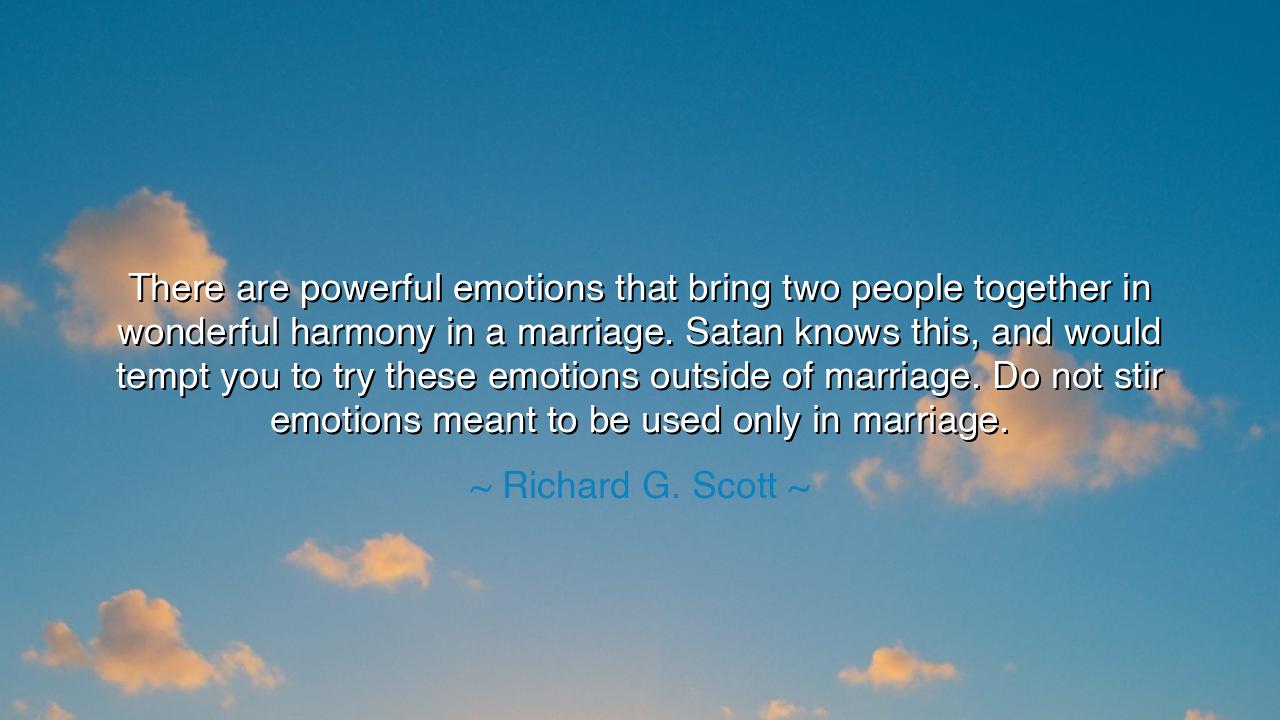
There are powerful emotions that bring two people together in
There are powerful emotions that bring two people together in wonderful harmony in a marriage. Satan knows this, and would tempt you to try these emotions outside of marriage. Do not stir emotions meant to be used only in marriage.






“There are powerful emotions that bring two people together in wonderful harmony in a marriage. Satan knows this, and would tempt you to try these emotions outside of marriage. Do not stir emotions meant to be used only in marriage.” — Richard G. Scott
In this sacred and solemn counsel, Richard G. Scott, an apostle and teacher of The Church of Jesus Christ of Latter-day Saints, speaks with the gravity of one who understands both the beauty and the peril of human passion. His words are a reminder that the emotions of love and intimacy, though pure in their divine origin, can become dangerous when removed from the holy bounds of marriage. He teaches that these feelings — tenderness, desire, unity — are not base instincts to be exploited, but sacred powers, entrusted by God to bind husband and wife in spiritual harmony. To misuse them is not merely to break a rule, but to distort something divine.
From the earliest days of creation, the joining of man and woman has been regarded as one of heaven’s greatest gifts. In the ancient record, Adam and Eve were commanded to become “one flesh” — a symbol not only of physical union but of complete oneness in heart and purpose. That union was meant to mirror the very harmony of the Creator Himself, for within it lies the power to create life and nurture eternity. Elder Scott’s warning arises from this sacred understanding: that the passions designed for union are holy, and that when awakened without covenant or commitment, they bring confusion instead of peace, sorrow instead of joy.
The ancients knew that all powerful forces — fire, water, wind — can bless or destroy depending on how they are governed. So too with the emotions of love. Controlled by virtue, they warm the heart and illuminate life; unleashed in selfishness, they consume the soul. Elder Scott’s use of the word “Satan” symbolizes this truth: that there are influences in the world which seek to pervert divine gifts for fleeting pleasure, replacing eternal joy with temporary gratification. The warning is not one of fear, but of reverence — a reminder that sacred things must be handled with care.
History and scripture alike are filled with stories that bear out this truth. Consider the tale of David and Bathsheba — a man of great faith who, in a moment of weakness, yielded to desire outside of marriage. What began as temptation soon led to ruin: betrayal, death, and the loss of divine favor. His heart, once devoted to God, became darkened by guilt. Yet his sorrow, and his eventual repentance, teach us the same lesson Elder Scott imparts — that the emotions of love are not evil, but holy; they must be used as God intended, or they will bring destruction where they were meant to bring creation.
Elder Scott’s counsel also points to the sacredness of self-control — one of the greatest virtues in both ancient and modern wisdom. The philosophers of old spoke of temperance as the guardian of the soul, the strength that allows a man to master his desires rather than be enslaved by them. In the same way, Scott teaches that chastity and restraint are not chains upon joy, but shields that protect the heart from false promises. For emotions ungoverned may feel like freedom, but they soon reveal themselves as bondage. True liberty lies in the ability to choose the right use of divine power.
There is, in his teaching, not condemnation but compassion. He acknowledges that love is one of the most powerful forces known to man — capable of binding souls, softening hearts, and healing wounds. But he also reminds us that power without purpose leads to ruin. The emotions that create harmony in marriage were designed to deepen trust, strengthen families, and bring forth life. To take them outside that sacred covenant is to strip them of their sanctity and turn them into shadows of what they were meant to be.
Let this be the teaching handed down to all who seek wisdom: guard your emotions as treasures, for they are divine gifts. Do not awaken what is meant for eternity in moments of passion or vanity. Seek not pleasure without purpose, but purpose that leads to everlasting joy. When love is anchored in faith, sealed by covenant, and guided by virtue, it becomes more than feeling — it becomes creation, harmony, and peace. But when love is severed from righteousness, it becomes a counterfeit light, dazzling for a moment, then gone. As Elder Richard G. Scott teaches, hold sacred the emotions of the heart, for they are not meant to be stirred lightly, but to bind souls forever in the holy union that heaven itself ordained.






AAdministratorAdministrator
Welcome, honored guests. Please leave a comment, we will respond soon